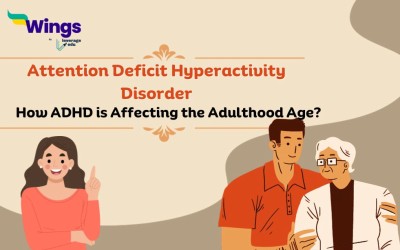ADHD in Adults: Although ADHD is mostly common among kids, it can still affect a lot of adults if not curred at an early stage. Challenges of ADHD are not limited to younger people. Middle-aged people often suffer from hyperactivity, impulsivity and inattention. But what’s more concerning about ADHD in adults is emotional distress and low self-esteem, which can have a lasting impression. Let’s check out how ADHD affects adults and how we can cure it.
Also Read: Know All About World Stroke Day 2023 Theme
Also Read: Psychological Disorders Class 12 Notes
ADHD in Adults
Reports released by different health organisations mostly highlight the cases of ADHD in children. However, ADHD also affects a large number of young adults, who find it difficult to talk about this chronic disease due to several reasons.
- Adults with ADHD often struggle to maintain attention during a task, leading to difficulties in staying organized, managing time, and completing work or other responsibilities.
- Although the symptoms of hyperactivity and impulsivity appear differently in adults than in children, the former often experience restlessness, difficulty relaxing, and impulsivity, which can manifest as impulsive decision-making or interrupting others in conversation.
- Poor management of time can lead to challenges in meeting deadlines, punctuality, and managing their schedules effectively.
- Chronic difficulties in managing symptoms can lead to feelings of inadequacy, low self-esteem, and frustration, particularly when individuals compare themselves to others or struggle to achieve their goals.
- Personal or relationship problems can make it difficult for stable and healthy relationships due to communication difficulties, forgetfulness, and difficulties in following through on commitments.
Also Read: National Unity Day 2023
How to Cure ADHD in Adults?
It’s crucial to cure a chronic condition like ADHD, as it can make your day-to-day life difficult and affect both your personal and professional life. There is no specified medication or treatment for ADHD, but several tips can surely help you with your condition or the person who is suffering from it.
- Medications like stimulants and non-stimulants can be a great way to cure ADHD in adults. These can improve focus, and attention and control impulsive behaviour. Common stimulants are methylphenidate (Ritalin) and amphetamines.
- Regular therapy and counselling, such as cognitive-behavioral therapy (CBT) and psychoeducation can be beneficial for adults with ADHD.
- You can enrol the patient in skill-building programs that can teach those with ADHD how to manage their symptoms more effectively. These programs often focus on organizational skills, time management, and strategies for coping with impulsivity and distractibility.
- Change in daily habits like regular exercise, a balanced diet, adequate sleep, and the establishment of structured routines and schedules to improve time management and organization.
- Joining support groups or participating in educational workshops can provide valuable insight and encouragement from others facing similar challenges.
- Support from family and friends can help create a supportive environment. This will allow open communication to help improve relationships and provide a strong support system for the individual with ADHD.
Note: This is not a piece of medical advice, you must seek counselling if required.
Related Articles
FAQs
Adults suffering from ADHD struggle with sustaining attention during tasks, leading to difficulties in staying organized, managing time, and completing work or other responsibilities.
The three types of ADHD are: Hyperactivity; Impulsivity; and Inattention
Here are some ADHD coping strategies: staying organised; meeting deadlines; staying focused; and reaching out to friends and family for support.
For more information on such interesting topics, visit our trending events page and follow Leverage Edu.


 One app for all your study abroad needs
One app for all your study abroad needs












 60,000+ students trusted us with their dreams. Take the first step today!
60,000+ students trusted us with their dreams. Take the first step today!